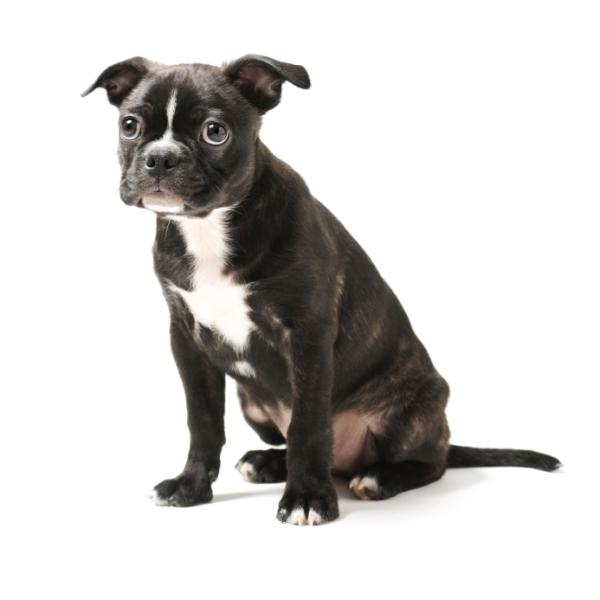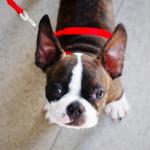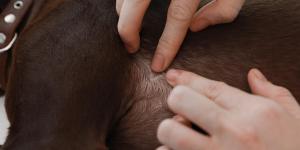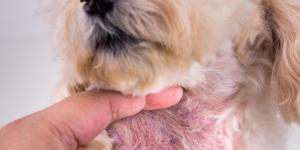Boston terrier

The Boston Terrier is an elegant, cheerful and sociable dog. It can be the ideal pet for both dog experts and novice owners. We are talking about a small dog, easy to care for and extremely affectionate. It is perfect for all types of families and we should not devote excessive time to their education. The main quality of this dog is their high sociability, their good behavior and the attachment they have with their family.
In this AnimalWised breed file we will detail everything about the Boston terrier, including their physical characteristics, their character and the specific care that owners need to take into account. Keep reading and find out if this breed is right for you.
Do not forget that the Boston terrier is a small and really fragile dog, so if you have children at home you must educate them to treat them correctly and carefully.
- America
- United States
- Group IX
- 5-14
- 14-18
- 18-22
- 22-27
- 27-31
- More than 31
- 2-7
- 7-22
- 22-55
- 55-100
- 100-220
- 8-10
- 10-12
- 12-14
- 15-20
- Low
- Meidum
- High
History of the Boston terrier
Unlike other dog breeds, the Boston Terrier has a well-documented history. The breed was developed by a coachman who worked for wealthy people of Boston, in 1865. This coachman used to create crosses between his employers' dog breeds, and began crossing an English terrier with a bulldog. It is from this crossing that this breed bears the word "terrier" in its name, but currently there is nothing left of those harsh hunting dogs in the boston terrier.
The offspring of that cross were reproduced only with small dogs and, mainly, with French bulldogs. That explains the great resemblance between the boston terrier and the french bulldog. With the passage of time, the boston terrier became increasingly popular and today is one of the most prized dogs in the United States and parts of Europe. In Latin America it is hardly known still, but it is not totally unknown.
Traits of the Boston terrier
The body of the boston terrier is short, compact and of square structure, that is to say that its length is equal to the height at the withers. This dog's legs are strong due to their size and elegant. The Boston Terrier's head is short and square. It is well proportioned to the rest of the body and its expression denotes a high degree of intelligence. The nose, black and broad, has a well defined groove between the nostrils.
These dogs have a prognathism (lower jaw longer than the upper one) that gives their snout a square shape. Their eyes are large, round and dark. Their ears are small and erect. Unfortunately, the FCI standard accepts the cropped ears, provided they are erect. This practice, although it may give this breed the desired appearance, is nothing more than mistreatment and disrespect towards animals, and is prohibited in many countries. The Boston terrier's tail is short, slender and low insertion. It is straight or in the shape of a corkscrew and should not exceed the horizontal.
This breed's coat is typically short, smooth, shiny and has a fine texture. It can be brindle-colored, "seal" or "seal color" (black with reddish hue), or black with white markings.
The FCI breed standard does not indicate a particular height, but the height at the withers is about 40 centimeters (15.7 in). On the other hand, the ideal weight, which is indicated in the breed standard, is divided into three categories:
- Dogs under 15 pounds (less than 6,8 kilograms)
- Dogs weighing between 15 and 20 pounds (6.8 to 9 kilograms)
- Dogs weighing between 20 and 25 pounds (between 9 and 11.35 kilograms)
Boston terrier temperament
These dogs are friendly, sociable and gentle. In addition, they are very loyal and intelligent. Their good character has made them the favorite pets of many families around the world.
They are usually very friendly dogs when it comes to people, although somewhat reserved at first with strangers. In addition, they have the reputation of being great friends for children, but you have to make sure that small kids do not harm these dogs. They also tend to get along with other dogs and can learn to coexist with other pets. Either way, it is important to socialize these dogs when they are still puppies.
Boston terriers have a high degree of intelligence, but are misunderstood by many coaches of ancient traditions, who think they are stupid and stubborn dogs. The truth is that these dogs learn very easily when they are trained with positive methods, such as clicker training. They can learn a variety of things when the trainer understands and applies the fundamental principles of canine training.
Although they do not present particular problems when it comes to canine behavior, these dogs demand a lot of attention and company, which can be complicated for those who do not have enough time for a pet. If they are left alone for prolonged periods they can be destructive or even develop separation anxiety.
In short, these dogs are excellent pets for families with and without children, as long as owners have enough time to be with their dogs. Although Boston terriers are not aggressive, it is not advisable to adopt such a breed if you have very small children, as they are fragile dogs that can suffer abuse and get injured easily.
Boston terrier specific care
The Boston terrier hair is easy to care for and it is usually enough to occasionally brush and bathe them, only when the dog is dirty. These dogs lose hair regularly, but not much.
As far as exercise goes, the Boston Terrier does not need much. Your daily walks are usually enough to keep your pet in good shape, but also enjoy some catching and ball games. Many owners practice canine agility and freestyle training with their dogs, which are sports that can be enjoyed with this breed. However, we must take the risks that the Boston terrier faces by doing intense exercise in warm climates seriously. These dogs should never be forced to exercise under high temperatures because they can suffer fatal heat strokes.
On the other hand, these dogs need a lot of attention and companionship. They are not dogs to leave alone for a long time and are not suitable for families who spend all day outdoors. They are a great choice for those living in an apartment and spend lots of time indoors, even if they live in a house. If they have a garden, they can use it to play and have fun, but only when they are with their family. Otherwise, they will prefer to stay inside the house. They should not sleep outside because their coat does not provide them enough protection.
Boston terrier training
The education of the Boston terrier will be very simple, as this breed is a sociable dog by nature. Even so, it is still extremely positive for the dog to work in depth socialization and learning the various basic orders of obedience. As this is a very intelligent dog, they will have no problem adapting to learn different actions, provided that we use positive reinforcement.
Boston terrier health
Unfortunately, due to its particular morphology, this breed is predisposed to various canine diseases. Boston terriers are prone to cataracts, patellar dislocation, epilepsy, heart problems, allergies and sensitivity to anesthesia and other chemicals. In addition, they are very susceptible to heat stroke and that is why you have to take good care of them in warm environments. Avoid extreme exercise when there are high temperatures.
It is also known that these dogs are not good swimmers, so they can drown easily if they fall into the water. It is better to be safe than sorry, so you should avoid risks if you have a pool.
Boston terrier photos




















